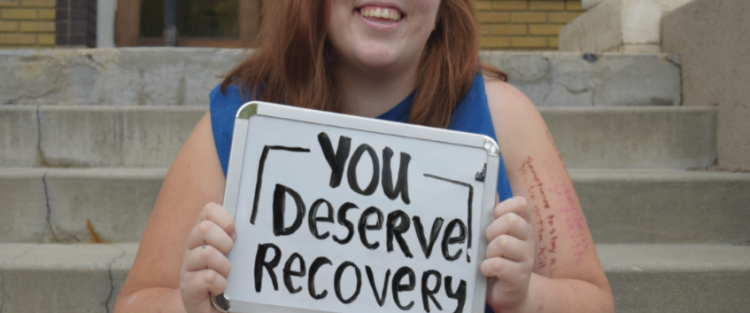Holden smiled at me when I got to the dining hall and hovered slightly behind while I selected nourishment. I’d appreciated he was so quick to answer my text about needing an eating buddy, but desired some alone time while picking the tools of my soon-to-be surrender. It was going to be a bad day. I was operating in a haze and when it became 11 a.m., my only concern was how many calories I could burn by pacing in my room. I knew texting Holden was my only option. We sat down and I carefully peeled open my yogurt, hoping it would render me hungry and I’d snap out of it. This didn’t happen, as each spoonful burned my throat on the way down and my stomach retched in shame because I just couldn’t give myself what I was needed to live: food. Holden asked no questions and I gave no answers, we ate in silence. The kindness I felt from him grounded me to the task at hand, but the funeral march continued in my head. One more bite, one more bite.
Recently a good friend remarked she was afraid of how easy it was to have an eating disorder in college and even more startled at the rate one might reemerge. Like it ever went away in the first place. Stuck between the good days and the bad days, the languishing effect of always feeling like “too much.” Do I take up too much room? Do they want me to take up less room? The start of college saw good days that slowly crawled out of what I thought was an impossibility of delight. We collaborated to vanquish the bad days into brief periods where leaving bed felt like giving up and my surroundings taunted me. Too fat, too much food, too much space. Though, I was feeling better than I had in years, this was frustrating. It felt like enough to completely heal, but wasn’t. Like all the time I had been screaming into the void had culminated in the void sending a microphone back and asking me to speak up.
In all honesty, I couldn’t tell you when I started existing between spaces of disordered eating. It happened years ago, in patterns of self demise — planned and unplanned — all with the goal of disappearing. Do I take up too much room? It worked, soon my jeans fit loosely around my hips, like I’d always wanted and people started to treat me differently. Heralding my terrorized accomplishment as someone who appeared to have beat laziness and actually “put the fork down.” I was the high school heroine, who finally shed the weight and now the rest of my life awaited me. How could I not love what disordered eating had done to me when they believed I was succeeding?
Things are not as hard for me now and the more I talk about my relationship with food, the easier moving on has become. I am lucky enough to be surrounded by friends who do nothing but love and support me, along with the most wonderful parents. After some visits to the therapist, I’ve learned other ways to manage hurt and tie these emotions to the intangible instead of food. Now, whenever I am caught in thinking about my old ways, I see the love I am surrounded by and though it’s not enough to exist on love alone, it makes trusting in tomorrow and my ability to carry on worth it. After Holden said goodbye to me that day, he texted periodically to check in, ending with one final message before dinner. “Please eat Cozy, you deserve it.”
My life is no longer categorizable into dark and light as both have taken up residency in my being, for the better. With this came the confidence of recovery and the purpose of the nothingness that ignited the question of what else I would experience and carry with me. There are no more good days and bad days, with both having merged into a steady pace of existence. You deserve life Cozy, in all its complexities and emotions. Only lately have I realized this means living with an eating disorder. That’s OK, because I can conquer it and that battle is not something anyone should face alone. We can do anything and I am alive.

This post originally appeared on The Forum.
If you or someone you know is struggling with an eating disorder, you can call the National Eating Disorders Association Helpline at 1-800-931-2237.
We want to hear your story. Become a Mighty contributor here.

